A Texas Town Refuses Fracking Expansion
Published: July 1, 2020
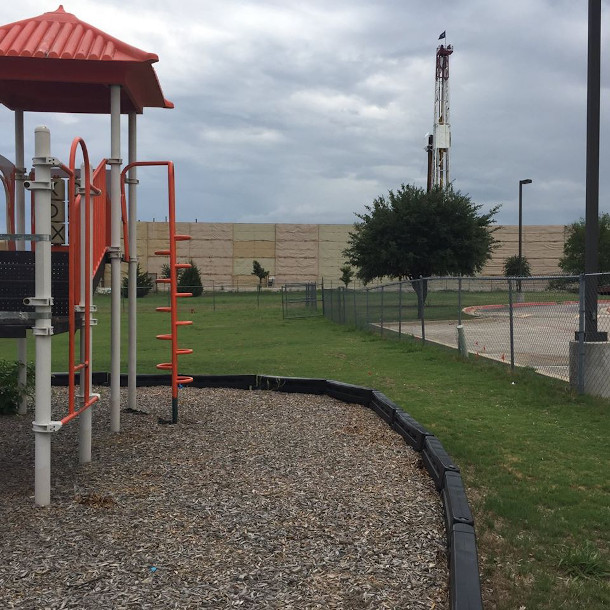
Cornerstone Academy is a preschool in Arlington, Texas, located only a short distance from a Total drilling site. The recent decision from the City Council prevented the expansion of another drillsite that is close to another preschool. (Photo: Courtesy of Tammie Carson)
(stream/download) as an MP3 file
The City Council of Arlington, Texas has taken a historic stand by refusing to expand a fracking complex located next to a preschool that serves primarily Black and Latino children.
Also, eye contact can be powerful, a knowing look exchanged between beings. And for Living on Earth’s Explorer in Residence, Mark Seth Lender, nothing compares to catching the eye of a wild elephant.
CURWOOD: Hi, I’m Steve Curwood and today on the Living on Earth Podcast we’ll hear about Arlington, Texas which is already home to some 350 gas wells.
Its city council went against official state policy and voted to not allow an expansion of natural gas fracking in a community of color.
We’ll also have an essay from our Explorer in Residence, Mark Seth Lender.
But first, your support helps make it possible to bring you this podcast, so please contribute what you can.
Five dollars or more makes a difference.
You can donate right now at LOE.org and thanks!
[THEME]
CURWOOD: With a spotlight now on institutional racism the City Council of Arlington Texas has taken a historic stand by bucking a state law and refusing to expand a gas well complex close to a preschool for black and brown children. There are about 350 natural gas fracking wells and 400,000 people in Arlington, which is located between Dallas and Fort Worth in North Texas. In the past the Arlington city council has disproportionately approved more fracking wells located near neighborhoods of color than in white neighborhoods. But recently environmental justice advocates convinced the council to reject the drilling near the preschool of two more wells by Total Barnett, part of the French oil giant Total S.A. Ranjana Bhandari is an economist and the founder of the environmental advocacy group Liveable Arlington, and she joins us now.
Ranjana, welcome to Living on Earth!
BHANDARI: Thank you, Stephen. Thanks for having me.
CURWOOD: Tell me what's the history of Arlington, Texas with regard to oil and gas drilling?
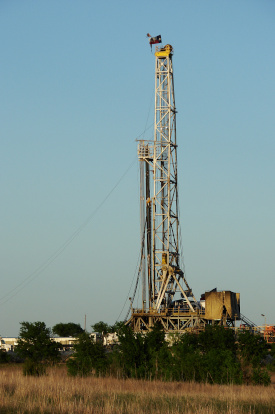
An oil drilling rig in the Barnett Shale in Northeast Texas. (Photo: David R. Tribble, Wikimedia Commons, CC BY-SA 3.0)
BHANDARI: Arlington lies on top of a formation called the Barnett Shale. And about 12 years ago, drillers discovered that using horizontal drilling, they could drill under built-up areas with homes and schools and parks. And so drilling arrived here about a dozen years ago, and it was presented to the community as a safe way to produce energy at home. Most people signed on. They were promised high royalties and a very safe process of drilling. None of those promises turned out to be true, and drilling continued to expand and now we have about 350 gas wells, 55 drill sites, and most of these are located very close to our homes and schools.
CURWOOD: What are some of the health effects that come from living around these drilling sites?
BHANDARI: When drilling first arrived, there were no studies done to establish that fracking was safe. And there was very little research about the health effects. Over time that has changed, there are now thousands of peer reviewed studies that point to a multitude of health effects that include respiratory disease, asthma, higher incidence of cardiac disease, more hospitalizations, and poor birth outcomes that include preterm birth and low birth weight. So the evidence has really mounted in the last 12 years that this has been a very dangerous thing for people who live around drilling.
CURWOOD: Why is this a matter of environmental justice?
BHANDARI: When this hearing happened, our council was very concerned with issues of racial equity in light of what is happening nationwide in the aftermath of the killing of George Floyd. They started out that council meeting by passing two resolutions on racial equity, expressing their desire to work towards reducing racial disparities. An hour or so later, this was the agenda item that came up. And all these issues were brought up by residents. The fact that the impact of this particular expansion of drilling would disproportionately impact people of color. This drill site is located in the eastern part of Arlington in a zip code that has the highest incidence of COVID-19 at this time in Arlington. It also is in a neighborhood where half the population is African American. And more than 20% of the population is Latino. And they have a poverty rate there of more than 25% and one in three children there live in poverty. This drill site is right next door to a preschool that largely serves children of color. 80% of their children are black, the rest are Latino kids. From the playground, you have a very good view of the drill site and the principal's spoke, and she spoke very powerfully about the impact this would have on her children now, and potentially in the future because they would be exposed. According to a Harvard health study, places that have higher levels of air pollution have experienced higher morbidity from COVID-19. We also know that African Americans are dying at a much higher rate from COVID-19 in our country than the rest of the population. African Americans have a death rate from COVID which is almost three times higher than the death rate for white people. So it is a matter of environmental justice because of the demographics of this neighborhood. And we are going through acute economic distress, so people don't have access to health care, people are struggling financially. And one of the things we discovered in talking to neighbors was that there's a fairly high incidence of childhood asthma. Asthma is a very expensive disease. The studies have established that it costs about $32,000 a year to manage asthma. So that is a very high burden to place economically on people, especially at this point in time.
CURWOOD: By the way, I've heard that there's a law in Texas, about fracking bans. What is this law?
BHANDARI: There's a law called HB 40 that was passed five years ago by the state legislature in response to the city of Denton banning fracking within its city limits. At that time, industry and our politicians colluded to pass this bill called HB 40, which essentially, was supposed to be a ban on fracking bans. But it went much further. It basically said that no city in Texas had the right to regulate drilling anymore. And as long as drilling was deemed to be commercially reasonable, it would be allowed, even if a city determined that it was harmful to its residents.
CURWOOD: So, where does Arlington's battle with the oil and gas companies go from here?
BHANDARI: You know, that is a very good question. My first hope is that given the particular facts of this case, industry will just stand down. Total, which is a large global energy conglomerate based in France, a country that has banned hydraulic fracturing within its limits because they think it is unsafe for their citizens, is the company that wants to drill here. They have 38 drill sites in our city. They have a few hundred wells here. And I think that they are showing that they are a particularly bad neighbor in this case, because they're showing such disregard for the affected neighborhood. So, I'm hoping that seeing the facts of the case as was presented to them, facts that they should have gathered before they came up for a vote, they will just stand down. That is what good corporate citizenship would require. If they don't, this will be a first in Texas since that bill was passed where a city did something to protect its residents that might actually clash with HB 40. So we're all waiting to find out what happens.
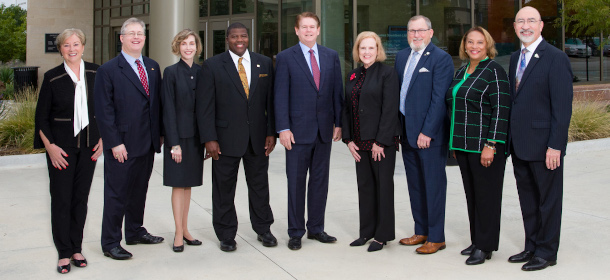
Six of the nine members of the Arlington City Council voted to reject the plans for expanding the Arlington gas well site. (Photo: Courtesy of Arlington City Council)
CURWOOD: What does this victory say about the power of local organizing, Ranjana?
BHANDARI: I think it says a lot about the power of local organizing. We worked really hard. We built a very diverse, multiracial coalition. We talked to more than 1,000 people in the neighborhood. We worked with the social justice committee at a very large Catholic Church nearby. We worked with immigrants rights advocates, and of course, the preschool and the affected parents there. I think if we all work together, and speak up in one voice and point to the pertinent issues, which is the harm being done to people, and particularly in this case, children and children of color. I think that argument made in this way, moves our leadership. Our leadership has been very pro-drilling for the entire period the fracking has been happening here. The city has made more than $100 million, I think approximately $150 million in royalties from fracking. But I think this win shows that even a city that has benefited to such a large degree from fracking is concerned about how it's affecting our children. And so I think this is a very important win. It shows the power of organizing, it shows the power of organizing outside of traditional environmental groups. It shows the power of organizing that truly centers impacted communities and makes them the voice of the harm being done.
CURWOOD: Ranjana, you were trained as an economist, what's your perspective from that discipline about what's happening with fracking there in Arlington, and indeed on the planet at this point?
BHANDARI: So fracking was presented to this community and I'm sure other communities as a costless way for people to make money while helping America become independent in its energy needs. That was what we were told. And then there was a lot that was missing. Fracking happened because the 2005 Energy Act exempted from some of our major federal environmental laws, like the Safe Drinking Water Act. And what has happened in the 12 to 15 years since fracking started, is that the economic benefits from fracking have been privatized. But the cost of fracking has been spread across hundreds of towns and communities like ours. It has led to air pollution, higher medical costs, it has led to tainting of our water supplies, and none of those costs are measured by the market or factored into the price of cheap natural gas that fracking has produced. All of those costs impact local communities. So the benefits have been private, the costs have been socialized. And then of course, there's the much bigger costs; the climate crisis that is already here and that is going to impact our children very, very seriously. The economic cost of the climate crisis is measured at trillions and trillions of dollars in economic disruption, the cost of mitigation, and the health costs, and all of that will fall on our children. So the market is not really qualified to make a judgement about the benefits here because the market does not take into account any of the costs of fracking.
Ranjana Bhandari is the founder of Liveable Arlington and a Public Voices Fellow with The OpEd Project. (Photo: Courtesy of Ranjana Bhandari)
CURWOOD: Those are some pretty difficult numbers, Ranjana.
BHANDARI: I think in places like Texas, where the fossil fuel industry is very important and very closely linked to our political system and our elected leaders, there is no motivation to outline these costs, but they're very easy to measure. For instance, I told you earlier, asthma, which is linked to air pollution and some of that air pollution is coming from all the drilling that is happening here in the Barnett Shale, costs upwards of $3,200 a year per person. Tarrant County, where I live, has the highest rate of childhood asthma in the country. 19% of our children have asthma. So when we look at the cost, that $150 million disappears very quickly.
CURWOOD: Ranjana Bhandari is the founder of the children's environmental advocacy group, Liveable Arlington. Thanks so much for taking this time with us today.
BHANDARI: Thank you, Stephen. Thanks for having me.
CURWOOD: Efforts to reach Total and its Texas affiliate by telephone and email for comment on this story were unsuccessful by the time we went to went to broadcast.
[MUSIC]
CURWOOD: To get the stories behind the stories on Living on Earth as well as special updates please sign up for the Living on Earth newsletter.
Every week you’ll find out about upcoming events and get a look at show highlights, and exclusive content.
Just navigate to the Living on Earth website loe.org and click on the newsletter link at the top of the page.
That’s loe.org.
[MUSIC]

The herd sticks together. (Photo: © Mark Seth Lender)
CURWOOD: Eye contact can be powerful, a knowing look exchanged between people. But for Living on Earth’s Explorer in Residence, Mark Seth Lender, there is nothing like catching the eye of an elephant.
Eye Contact
African Elephant
Hwange National Park
© 2020 Mark Seth Lender
All Rights Reserved
They mill about. If they were thirsty there is water nearby and plenty of it and they would go there. If they wanted food they would look for it and find it. They are in each other’s company, nothing more. It makes them whom and what they are.
Purpose enough.
Now a dark shape sudden and close: Tusks thick as posts, the wide brow, the ears outstretched, huge! The startled look, as if he did not expect me there, as if he turned a blind corner and was surprised, though I am in plain site. He stares. Unsure. An attitude they all share. And would prefer if the vehicle and the people riding on its open frame were at a distance.
Instead of in the midst.
Of wild elephants.
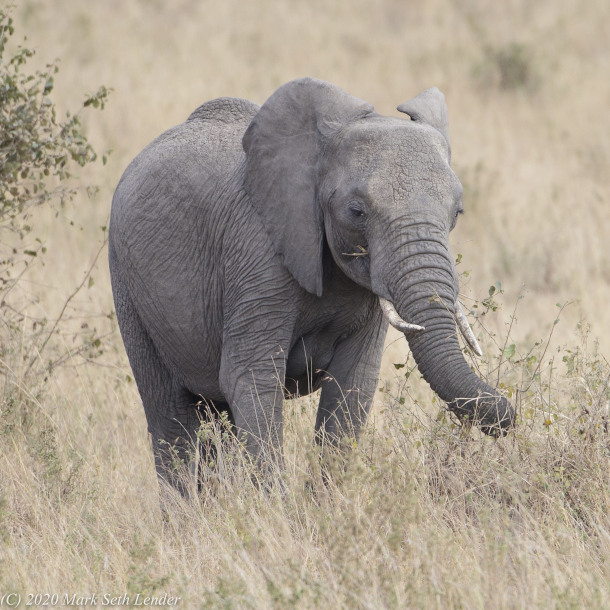
The young female elephant. (Photo: © Mark Seth Lender)
Under the midday sun.
In the total absence of shade…
The bull that was so close veers off and into the herd. I sit and watch the elephants.
On the periphery, at the other side of the clearing where the brush swallows the land, a young female is staring at me. She is twelve maybe thirteen, an age which means in her what it means in us. Her knowledge incomplete. The years of her majority distant. An age for discovery. Naïve, both to possibility and danger.
Every time I glance in her direction she is there looking at me. Me, in particular. So I lift my chin. Twice. Two quick gestures, deliberately as close as possible to imperceptible.
She sees - she was waiting for this - and returns that very same gesture.
And comes, towards me.
The herd is in motion. Revealing, concealing the line of sight. I see her then I don’t. She sees me then she doesn’t. I am there, then I am not but every time I loose sight of her sure that she changed her mind I see her again; we exchange the sign:
The nod, the softness around the eyes....
Again… Again…
We seek and find each other’s faces.
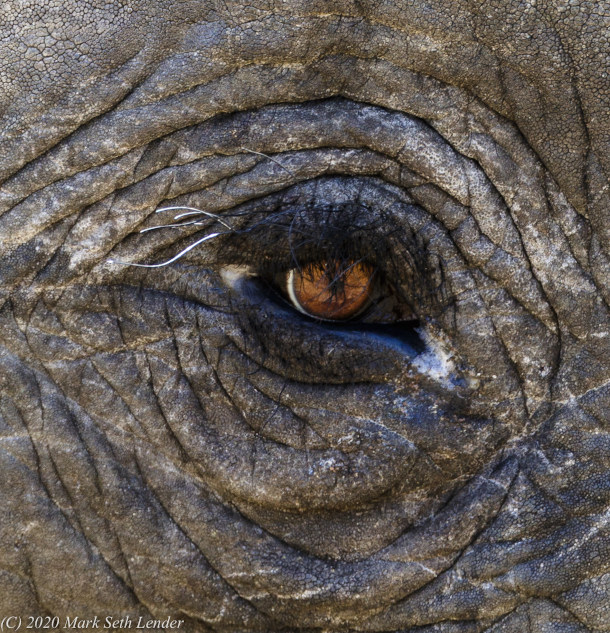
Eye contact with a wild elephant. (Photo: © Mark Seth Lender)
A reinforcement.
Of Recognition.
Consensus.
Consent.
On through the crowd, the mass of legs, expanses of skin thick and grey and furrowed as drought baked mud; until there is nothing and no one between us.
She raises her trunk.
I lift my hand.
She reaches out to me as I reach out to her -
And my guide slams his heavy fist on the hood and yells WHADDAYAH THINK YOU’RE DOIN’? GET OUTTA HERE!
I stood, I called to her out loud, Wait! It wasn’t me!
Too late… Too late.
Elephant, for the rest of her long life will think about this. As the day ends if she still lives she is thinking of it now. And as for me, I see that look on her face.
It haunts me.
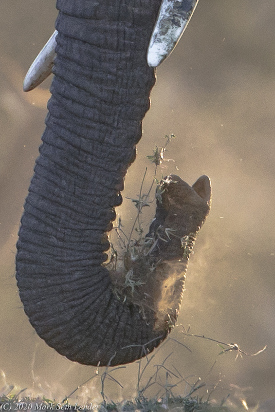
“She raises her trunk. I lift my hand.” (Photo: © Mark Seth Lender)
This is what I am left with.
That I will never be able to find her.
To tell her:
Come Back.
CURWOOD: That’s Living on Earth’s Explorer in Residence, Mark Seth Lender. For photos from Mark’s trip check out the Living on Earth website, loe.org.
[MUSIC]
CURWOOD: Living on Earth is produced by the World Media Foundation. Our crew includes Naomi Arenberg, Bobby Bascomb, Paloma Beltran, Thurston Briscoe, Jenni Doering, Jay Feinstein, Anne Flaherty, Don Lyman, Isaac Merson, Aynsley O’Neill, Jake Rego, Kori Suzuki, and Jolanda Omari. Tom Tiger engineered our show. Alison Lirish Dean composed our themes. You can hear us anytime at L-O-E dot org, Apple Podcasts and Google Podcasts, and like us please, on our Facebook page- Living on Earth. We tweet from @livingonearth. And find us on Instagram at livingonearthradio. I’m Steve Curwood. Thanks for listening!
ANNOUNCER: Support for Living on Earth comes from Sailors for the Sea and Oceana. Helping boaters race clean, sail green and protect the seas they love. More information at sailors for the sea dot org.
ANNOUNCER 2: PRX.
Links
The Liveable Arlington Website
Living on Earth wants to hear from you!
Living on Earth
62 Calef Highway, Suite 212
Lee, NH 03861
Telephone: 617-287-4121
E-mail: comments@loe.org
Newsletter [Click here]
Donate to Living on Earth!
Living on Earth is an independent media program and relies entirely on contributions from listeners and institutions supporting public service. Please donate now to preserve an independent environmental voice.
NewsletterLiving on Earth offers a weekly delivery of the show's rundown to your mailbox. Sign up for our newsletter today!
 Sailors For The Sea: Be the change you want to sea.
Sailors For The Sea: Be the change you want to sea.
 The Grantham Foundation for the Protection of the Environment: Committed to protecting and improving the health of the global environment.
The Grantham Foundation for the Protection of the Environment: Committed to protecting and improving the health of the global environment.
 Contribute to Living on Earth and receive, as our gift to you, an archival print of one of Mark Seth Lender's extraordinary wildlife photographs. Follow the link to see Mark's current collection of photographs.
Contribute to Living on Earth and receive, as our gift to you, an archival print of one of Mark Seth Lender's extraordinary wildlife photographs. Follow the link to see Mark's current collection of photographs.
 Buy a signed copy of Mark Seth Lender's book Smeagull the Seagull & support Living on Earth
Buy a signed copy of Mark Seth Lender's book Smeagull the Seagull & support Living on Earth

